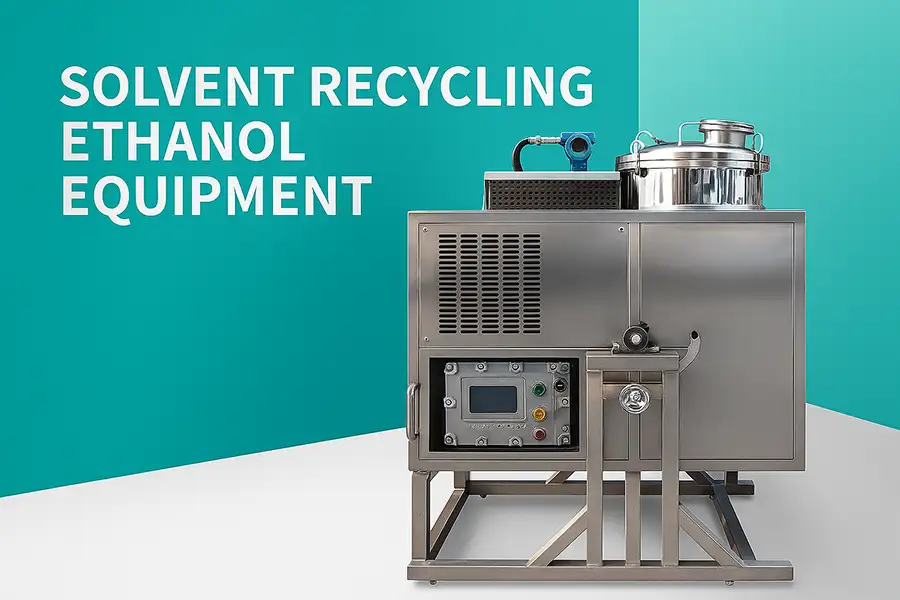Solvent Recycling Ethanol: A Complete Guide to Sustainable Recovery
Sustainable Ethanol Solutions for Modern Industries
Cost-effective recycling solutions that boost efficiency and reduce environmental impact
Ethanol is one of the most widely used solvents across industries—from pharmaceuticals and cosmetics to automotive and printing. However, large-scale use of ethanol also leads to significant waste generation. Fortunately, solvent recycling ethanol technology offers a sustainable and cost-effective solution to reclaim and reuse this valuable solvent.
According to the U.S. Environmental Protection Agency (EPA), solvent recycling can reduce hazardous waste generation by up to 70% in manufacturing facilities. This not only benefits the environment but also supports regulatory compliance and corporate sustainability goals.

What Is Solvent Recycling Ethanol?
Solvent recycling ethanol refers to the process of recovering and purifying used ethanol from industrial waste streams. Through distillation or other purification methods, contaminated ethanol can be restored to near-original quality and reused. This process reduces waste, saves costs, and minimizes environmental impact.
"Sustainable solvent management is no longer optional - it's a competitive advantage. Ethanol recycling represents a $3.2 billion opportunity in waste reduction and resource conservation." - Industrial Chemical Sustainability Report, 2024
How Does an Ethanol Solvent Recycler Machine Work?
A solvent recycler machine operates based on the principle of distillation. The contaminated ethanol is heated until it vaporizes. The vapor then passes through a condenser, where it cools and transforms back into liquid ethanol—clean and ready for reuse.
Modern systems, such as those described in our solvent recovery system guide, can achieve purity levels exceeding 99%, ensuring that recycled ethanol meets the stringent standards required for industrial applications.
Advanced Distillation Technology
Modern ethanol recyclers use multi-stage distillation processes and precision temperature controls to ensure maximum purity and recovery rates. Automated systems now achieve up to 95% recovery efficiency across multiple solvent types.
Question: What makes solvent recycling ethanol more efficient than purchasing new ethanol?
Answer: The efficiency lies in cost and sustainability. Recycled ethanol costs significantly less than new solvent purchases. Additionally, recycling reduces the need for raw material extraction and transportation, leading to lower carbon emissions. For industries consuming thousands of liters monthly, this translates to substantial savings and environmental benefits.
Key Benefits of Ethanol Solvent Recycling
Cost Savings
Reusing ethanol can cut solvent purchasing costs by 50-80% while reducing waste disposal expenses.
Environmental Protection
Recycling prevents solvent waste from entering landfills and water systems, improving your environmental footprint.
Regulatory Compliance
Modern systems help meet hazardous waste management regulations and sustainability reporting requirements.
Operational Efficiency
On-site recycling reduces downtime and dependency on external solvent suppliers, creating operational resilience.
Applications of Ethanol Solvent Recycling
| Industry | Usage of Ethanol | Recycling Benefit |
|---|---|---|
| Pharmaceuticals | Extraction and purification processes | Maintains solvent purity for critical drug production |
| Cosmetics | Used in perfumes and sanitizers | Reduces cost and waste from alcohol-based products |
| Automotive | Cleaning and degreasing parts | Minimizes solvent disposal challenges and saves resources |
| Printing | Ink formulation and cleaning | Reuses ethanol for cleaning rollers and plates at scale |
| Electronics | Resin cleanup and component cleaning | Provides high-purity solvents for sensitive processes |
Question: Can ethanol recycling systems handle mixed solvents?
Answer: Yes, advanced systems such as the solvent recycling system can separate and purify mixed solvent streams. They use fractional distillation techniques to recover each solvent based on its boiling point, ensuring high recovery efficiency. For multi-solvent applications, consider our multi-component solvent recyclers.
Challenges and Solutions in Ethanol Recycling
While ethanol recycling offers numerous benefits, challenges such as contamination from oils or other chemicals can occur. To overcome this, modern units incorporate multi-stage filtration and automated cleaning systems. These technologies maintain consistent solvent quality and reduce manual intervention.

"Global solvent recycling technology adoption is expected to grow by 45% by 2030, driven by stricter environmental policies and rising solvent costs." - International Energy Agency (IEA)
Question: What is the best way to dispose of ethanol if recycling is not possible?
Answer: When recycling is not feasible, ethanol should be disposed of safely following environmental guidelines. Our detailed guide on how to dispose of isopropyl alcohol provides insights that also apply to ethanol disposal—never pour ethanol down drains or into soil; instead, use certified waste management services.
The Future of Solvent Recycling Ethanol
The future of solvent recycling ethanol lies in automation and AI integration. Smart solvent recovery units can monitor purity levels, predict maintenance needs, and optimize energy usage. As technology evolves, ethanol recycling will become even more accessible and efficient for all scales of operation.
AI-Powered Recycling Systems
Next-generation recyclers use machine learning algorithms to optimize distillation parameters in real-time, adapting to solvent mixtures and contamination levels for maximum efficiency and minimal energy consumption.
Ready to Transform Your Solvent Management?
Discover how our solvent recycling solutions can reduce costs and environmental impact
Explore Recycling EquipmentConclusion
Solvent recycling ethanol is not just a technical process—it's a commitment to sustainability, efficiency, and responsible manufacturing. By adopting modern solvent recovery technologies, industries can reduce waste, save money, and contribute to a cleaner planet.
Whether operating a small lab or a large industrial facility, investing in a reliable solvent recycling system ensures long-term benefits for both business and environment.
